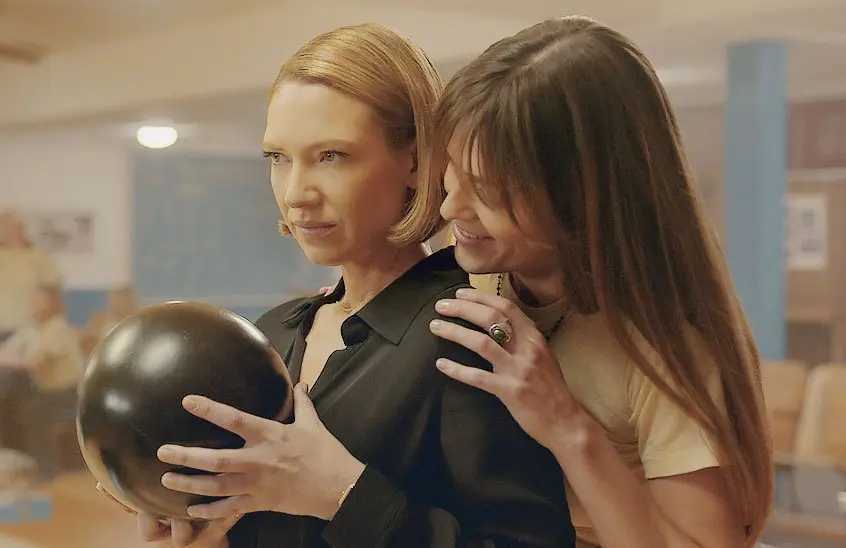Mindhunter's LGBTQ Subplot Is Quietly Devastating
-
 Anna Torv and Lauren Glazier in Mindhunter (Netflix)
Anna Torv and Lauren Glazier in Mindhunter (Netflix)Spoiler alert: This post contains spoilers from Seasons 1 and 2 of Mindhunter.
It's a joy to have Mindhunter back after an extended hiatus, even though "joy" is not a word you readily associate with the themes and events of the show. David Fincher's moody series about serial killers and the FBI agents willing to poke around in their dark brains isn't what you'd call a feel-good show. But it is incredibly satisfying if you're a fan of true crime, Fincher, Zodiac, Fringe, Jonathan Groff, historical footnotes, Easter eggs, or cool song drops over the end credits. One of the things that Mindhunter didn't deliver in its first season was much in the way of an LGBTQ angle. This, despite the fact that one of its main characters is a lesbian. In Season 2, the show begins to lean into that character's personal life and how it balances with her work in the Behavioral Science Unit.
Telling the story of how the FBI developed psychological profiling in order to catch a new breed of murderer known as the serial killer, Mindhunter is an atmospheric, often deeply unsettling affair —- one where crimes are investigated, but never really thwarted. The team led by Holden Ford (Jonathan Groff) and Bill Tench (Holt McCallany) crosses the country to interview locked-up serial killers and develop psychological profiles. Ford is the baby-faced, reckless agent with big ideas and poor people skills, while Tench is the surprisingly empathetic flat-foot. Into that dynamic in Season 1 stepped Dr. Wendy Carr (Anna Torv), who left her job in academia to join the Behavioral Science Unit, and has worked hard to provide the clinical rigor to their studies so that the data will hold up to scrutiny despite Ford's frequent attempts to cowboy his way onto dangerous ground.
In the fourth episode of Season 2, Ford and Tench are both called away to Atlanta, and rather than stay cooped up in the BSU dungeon reading files, Wendy takes up Gregg's suggestion that they go conduct the next scheduled interview themselves. Wendy's a novice in the field, but as they interview Elmer Wayne Henley Jr. about a series of murders of young men committed by Dean Corll and assisted by Henley (who was in some sort of homosexual thrall to Corll), Wendy takes pretty quickly to the Holden Ford school of improvisation. Seeing an opportunity to relate to Henley and get him to open up more about his level of partnership with Corll, Wendy begins talking about a sexual relationship she once shared with an older woman who was her boss and mentor. She tells Henley that she felt many of the same feelings of subjugation and being controlled that he felt with Dean. Gregg looks over at Wendy like she just sprouted a second head, but the tactic clearly works, and more importantly it gives Wendy a taste of the kind of high Holden gets when he makes a breakthrough in an interrogation.
The topic of Wendy's sexuality has thus far been treated in a low-key, matter-of-fact way. It's never come up in the course of doing her work, in part because it's never been pertinent, but also — in a manner that seems both clear and deeply recognizable to anyone who's ever been queer in a predominantly straight space — because keeping her sexuality under wraps has been the easier, smarter, less dangerous course of action. Wendy's not closeted — we see her out on a bowling date with Kay (Lauren Glazier), the bartender she met earlier in the season. There's a reticence to Wendy, yes, but she's not living a lie. And yet it's this transgressive moment in the Henley interrogation that feels the most assertively queer for her. Gregg — and later director Gunn (Michael Cerveris, who co-starred with Torv on Fringe) — assume Wendy made up the story as a tactic, and she doesn't correct them. But later, when the team is batting psychological explanations back and forth, some of the agents characterize homosexuality as a deviance, and Wendy has to push back on assumptions that were just beginning to become outdated.
Set in 1979, the second season of Mindhunter comes at a curious period in the long timeline toward gay civil rights. The American Psychiatric Association had, until as recently as 1974, considered homosexuality a mental disorder, and that would only be reflected in the Association's Diagnostic and Statistical Manual of Mental Disorders (DSM) in a 1979 republishing. And while the scientific community had turned the corner, that change in mindset was quite slow to filter down into the general population and, in fact, law enforcement.
Watching Wendy push back against Gregg, Tench, Ford, and their outdated opinions on homosexuality, while maintaining her calm, clinical demeanor is yet another reminder that Anna Torv is one of this show's great secret weapons. Ever since Fringe, it's been madness trying to figure out why people continued to sleep on her clear talent. Thanks to episodes like this one — in which Torv lets us peek through a window into Wendy's personal life, and the show acknowledges the fact that these early days of criminal profiling were dealing with terribly rudimentary conceptions of sexuality and attraction — her talent may finally garner some recognition.
People are talking about Mindhunter in our forums. Join the conversation.
Joe Reid is the senior writer at Primetimer and co-host of the This Had Oscar Buzz podcast. His work has appeared in Decider, NPR, HuffPost, The Atlantic, Slate, Polygon, Vanity Fair, Vulture, The A.V. Club and more.
TOPICS: Mindhunter, Netflix, Anna Torv, David Fincher